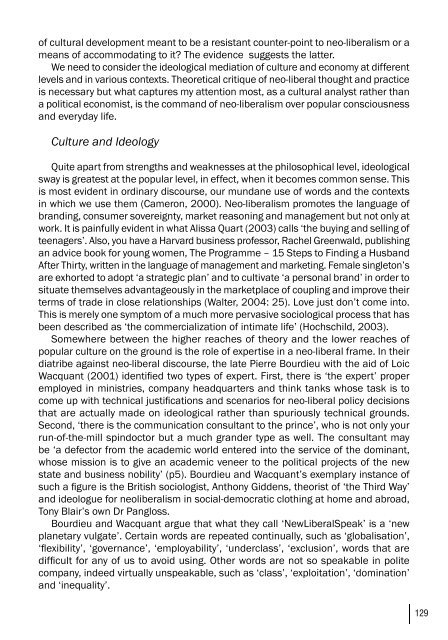art-e-conomy _ reader - marko stamenkovic
art-e-conomy _ reader - marko stamenkovic
art-e-conomy _ reader - marko stamenkovic
You also want an ePaper? Increase the reach of your titles
YUMPU automatically turns print PDFs into web optimized ePapers that Google loves.
of cultural development meant to be a resistant counter-point to neo-liberalism or a<br />
means of accommodating to it? The evidence suggests the latter.<br />
We need to consider the ideological mediation of culture and e<strong>conomy</strong> at different<br />
levels and in various contexts. Theoretical critique of neo-liberal thought and practice<br />
is necessary but what captures my attention most, as a cultural analyst rather than<br />
a political economist, is the command of neo-liberalism over popular consciousness<br />
and everyday life.<br />
Culture and Ideology<br />
Quite ap<strong>art</strong> from strengths and weaknesses at the philosophical level, ideological<br />
sway is greatest at the popular level, in effect, when it becomes common sense. This<br />
is most evident in ordinary discourse, our mundane use of words and the contexts<br />
in which we use them (Cameron, 2000). Neo-liberalism promotes the language of<br />
branding, consumer sovereignty, market reasoning and management but not only at<br />
work. It is painfully evident in what Alissa Qu<strong>art</strong> (2003) calls ‘the buying and selling of<br />
teenagers’. Also, you have a Harvard business professor, Rachel Greenwald, publishing<br />
an advice book for young women, The Programme – 15 Steps to Finding a Husband<br />
After Thirty, written in the language of management and marketing. Female singleton’s<br />
are exhorted to adopt ‘a strategic plan’ and to cultivate ‘a personal brand’ in order to<br />
situate themselves advantageously in the marketplace of coupling and improve their<br />
terms of trade in close relationships (Walter, 2004: 25). Love just don’t come into.<br />
This is merely one symptom of a much more pervasive sociological process that has<br />
been described as ‘the commercialization of intimate life’ (Hochschild, 2003).<br />
Somewhere between the higher reaches of theory and the lower reaches of<br />
popular culture on the ground is the role of expertise in a neo-liberal frame. In their<br />
diatribe against neo-liberal discourse, the late Pierre Bourdieu with the aid of Loic<br />
Wacquant (2001) identified two types of expert. First, there is ‘the expert’ proper<br />
employed in ministries, company headqu<strong>art</strong>ers and think tanks whose task is to<br />
come up with technical justifications and scenarios for neo-liberal policy decisions<br />
that are actually made on ideological rather than spuriously technical grounds.<br />
Second, ‘there is the communication consultant to the prince’, who is not only your<br />
run-of-the-mill spindoctor but a much grander type as well. The consultant may<br />
be ‘a defector from the academic world entered into the service of the dominant,<br />
whose mission is to give an academic veneer to the political projects of the new<br />
state and business nobility’ (p5). Bourdieu and Wacquant’s exemplary instance of<br />
such a figure is the British sociologist, Anthony Giddens, theorist of ‘the Third Way’<br />
and ideologue for neoliberalism in social-democratic clothing at home and abroad,<br />
Tony Blair’s own Dr Pangloss.<br />
Bourdieu and Wacquant argue that what they call ‘NewLiberalSpeak’ is a ‘new<br />
planetary vulgate’. Certain words are repeated continually, such as ‘globalisation’,<br />
‘flexibility’, ‘governance’, ‘employability’, ‘underclass’, ‘exclusion’, words that are<br />
difficult for any of us to avoid using. Other words are not so speakable in polite<br />
company, indeed virtually unspeakable, such as ‘class’, ‘exploitation’, ‘domination’<br />
and ‘inequality’.<br />
129


